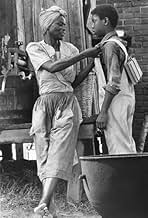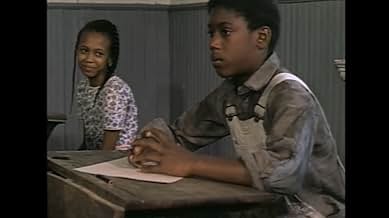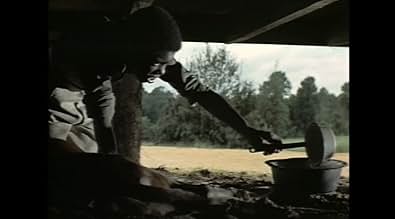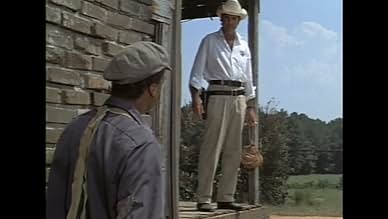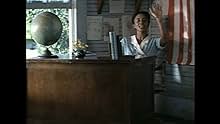El hijo mayor de una cariñosa y fuerte familia de aparceros negros alcanza la mayoría de edad en el Sur de la era de la Depresión después de que su padre sea encarcelado por robar comida.El hijo mayor de una cariñosa y fuerte familia de aparceros negros alcanza la mayoría de edad en el Sur de la era de la Depresión después de que su padre sea encarcelado por robar comida.El hijo mayor de una cariñosa y fuerte familia de aparceros negros alcanza la mayoría de edad en el Sur de la era de la Depresión después de que su padre sea encarcelado por robar comida.
- Dirección
- Guionistas
- Elenco
- Nominado a 4 premios Óscar
- 5 premios ganados y 12 nominaciones en total
- Harriet
- (as Sylvia 'Kuumba' Williams)
- Mr. Perkins
- (as Ted Airhart)
- Teacher
- (as Merle Sharkey)
- Judge
- (as Judge William Thomas Bennett)
- Pastor
- (as Reverend Thomas N. Phillips)
- Dirección
- Guionistas
- Todo el elenco y el equipo
- Producción, taquilla y más en IMDbPro
Opiniones destacadas
When I was watching this in the movie theatre for the first time in 1972, I was seated with my other high school friends behind 3 rows of a Southern Baptist Sunday School class, that was amply chaperoned by about 2 adults for every 5 children. Near the beginning of the film, as the family and Ike are passing a clapboard church that has a white congregation, David asks his father why black and white people go to different churches when God is the same God to everyone.
Ike pipes up and says once, when he was in another town, he accidentally stumbled into a white church on a Sunday morning, and was lucky to get out alive. So he asked God, "why did fellow Christians practically try to kill me just for coming to worship You with them?" And God replied to Ike, "Son, at least you got INSIDE a white church - I've been trying to do that for 2000 years!!" And with that, the entire 3 rows of Southern Baptist Sunday School, children and adults, stood up and walked out of the theatre! The truth hurts. This is a truthful beautiful movie. So glad I stumbled upon it today - just as Nathan Lee was coming home. Sigh.
Quiet, slow but ultimately very moving tale of a poor black family in the 1930s. There's some beautiful shots here (it was shot on location in Louisiana) and very little dialogue and only occasional music. I must admit I was getting a little bored at first--I wanted the story to MOVE! But the film slowly grew on me and, after half an hour, I was hooked. The images tell the story along with some very moving Oscar-nominated performances by Winfield and Cicely Tyson (as his wife). Even young Hooks (who was only 14 when this was done) is quite good. The film slowly works on you and, by the end, I was crying my eyes out--But don't worry--it DOES have a very happy ending.
This was a HUGE hit in 1972. It was one of the few G-rated films dealing with a black family. Unlike most other 1970s black films it had no drugs, violence, sex or swearing--this was a true rarity back then. And white, black, young and old audiences loved it. It works on all levels. It was also nominated for Best Picture. It didn't win anything but the fact that it was nominated was enough. The cast went through hell making it. I remember, in an interview, Winfield said it was brutally hot during the whole shot, the cast was eaten alive by mosquitoes and he caught a TERRIBLE case of hay fever from all the pollen. It's to this whole casts credit that they all give out good performances. Sadly...this film has been forgotten. That's too bad...it should be rediscovered.
There was a sequel 3 years later (with a different cast). It was "Sounder Part 2" but it seems nobody has ever seen it. But don't miss this one. A perfect family film.
The intimidating malevolence of the white ruling class is felt in cruel ways, such as shooting at a dog(?!) and not telling the family where their father has been sent after he steals some food ala Jean Valjean. It's also felt in ways that are silently menacing, such as facing stern, judgmental eyes as they constantly struggle to make ends meet because of the unfair sharecropping agreement, and when the boy simply glances at a giant house while on a walk far from his own home, one of my favorite moments in the film. The other is when a couple of different teachers give him books to read, the only shred of a hope to rise in socioeconomic class. I only wish the film had a little more edge to it, which apparently the book does.
Quote: Ike (recounting a time when he accidentally went into a white church): "...I went home and did me some praying to the Lord. I said, Lord, I went into this white church down in Row (County) and all I want you to tell me is how I ever got outta there in one piece." Nathan Lee: "What did the Lord tell you, Ike?" Ike: "He said, I don't know, Ike - you doin' better'n me, I been tryin' to get in there for 200 years and ain't make it yet!"
¿Sabías que…?
- TriviaCicely Tyson is 15 years older than Paul Winfield.
- ErroresJames Best as the Sheriff wears sideburns that, while characteristic for 1972, when the film was made, are definitely out of fashion for 1933, when it is set.
- Citas
David Lee: Miss Johnson? Don't you teach in your school about folk who ain't dead?
Camille: Sure! Here's one about a man who's very much alive. Dr. William E.B. DuBois.
David Lee: What does he talk about?
Camille: Here, I'll read something he said:
[reading from "Of the Training of Black Men"]
Camille: "The longing of black men must have respect."
[pauses to explain to David Lee]
Camille: Which means a man and a woman are human and must be treated that way.
[continues reading]
Camille: "The rich and bitter depth of their experience, the unknown treasures of their inner life, the strange rendings of nature they have seen, may give the world new points of view and make their loving, living, and doing precious to all human hearts. And to themselves in these days that try their souls, the chance to soar in the dim blue air above smoke is to their finer spirits boon and guerdon for what they lose on earth by being black."
David Lee: You're a nice lady, Miss Johnson.
- Créditos curiososThe 20th Century Fox fanfare doesn't play during the opening.
- ConexionesFeatured in Sneak Previews: The Life and Death of the Black Movie (1981)
- Bandas sonorasNeeded Time (Theme from Sounder)
Written by Taj Mahal
Performed by Lightnin Hopkins
Courtesy of Kent Records and special thanks to John Williams
Selecciones populares
Detalles
Taquilla
- Total en EE. UU. y Canadá
- USD 3,100,601
- Tiempo de ejecución1 hora 45 minutos
- Color
- Relación de aspecto
- 2.39 : 1
Contribuir a esta página



